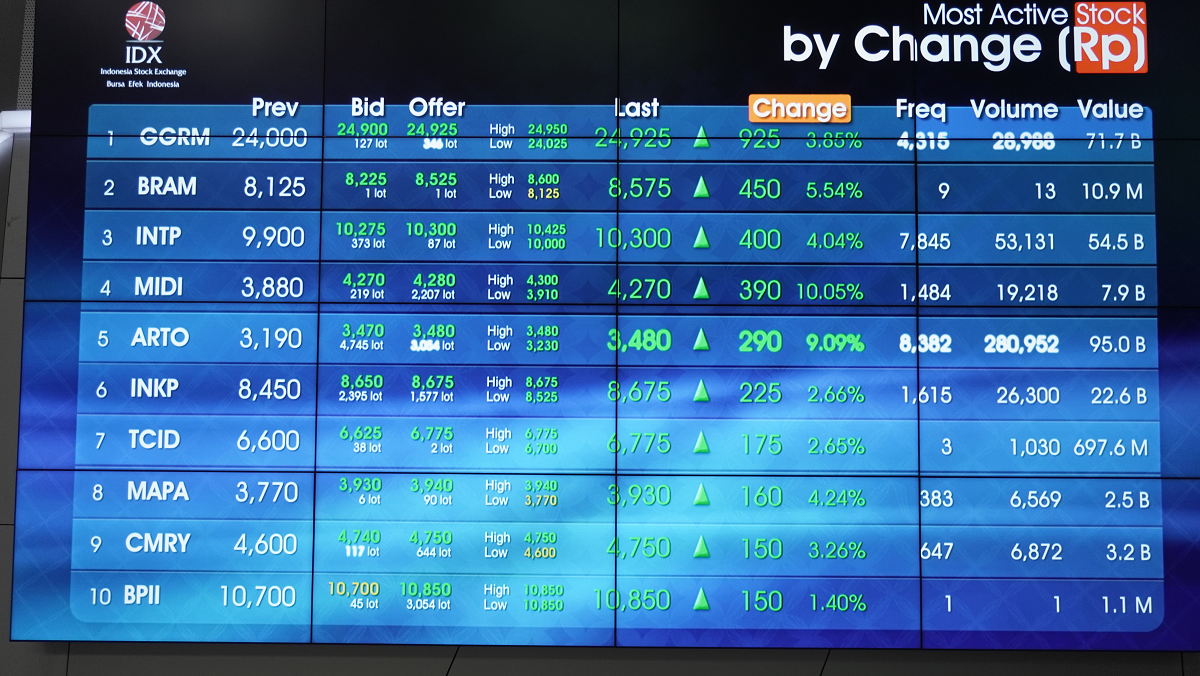The Indonesia Stock Exchange Composite Index (IHSG) experienced a slight weakening on Thursday, October 24, 2024, opening 8.89 points lower, or down by 0.11%, at 7,778.66. The blue-chip index, LQ45, which monitors the top 45 large-cap stocks, similarly saw a decline, falling 1.80 points or 0.19% to 952.94. This decline came as market participants exhibited caution, holding back from major moves as they awaited further developments related to the U.S. presidential election, which has been a major factor in shaping global market sentiment.
Fanny Suherman, Head of Research Retail at BNI Sekuritas, explained that the IHSG’s decline was likely to be limited, reflecting the market’s “wait and see” attitude ahead of the election. Suherman pointed out that the market had been on an upward trend since October 11, 2024, and this minor correction was not unexpected. With the U.S. election only weeks away, global investors remain uncertain about the implications of the election results for economic policy, trade, and market stability. This, in turn, has led to more cautious trading across global markets, including Indonesia.
Globally, mixed signals are emerging from key economies, further influencing investor behavior. The International Monetary Fund (IMF) on Tuesday, October 22, revised its 2024 growth forecasts for several major economies, reflecting the shifting global economic landscape. While the IMF raised its growth outlook for the United States, Brazil, and the United Kingdom, it cut its forecasts for China, Japan, and the Eurozone. The divergence in economic trajectories among these regions has left investors grappling with the complex implications for global trade and financial flows.
In Asia, recent developments in China have captured the attention of market participants. A notable driver of Chinese stock market gains has been the government’s announcement of a 2 trillion yuan issuance of special government bonds. The bond issuance is intended to support market stabilization and spur economic growth, as China continues to navigate its post-pandemic recovery and structural economic challenges. Investors have responded positively to the news, though there are still concerns about the broader economic conditions in China and how sustainable these rallies will be in the long term.
In contrast, U.S. markets have faced more challenging conditions in recent days. Wall Street closed lower as rising U.S. Treasury yields weighed on investor sentiment, particularly in the technology and large-cap sectors. The benchmark 10-year Treasury yield surged to its highest level in three months, heightening concerns among investors about borrowing costs and the potential for tighter monetary conditions in the near future. Additionally, worries about the Federal Reserve’s interest rate policy have added further pressure. While investors had hoped for a more dovish approach from the Fed, recent economic indicators have dampened expectations of rate cuts in the near term.
Corporate earnings have also contributed to the subdued mood in U.S. markets. Disappointing results from leading companies, including McDonald’s and Coca-Cola, have compounded concerns about the overall health of the economy, leading to a broad sell-off in equities. By the close of trading on Wednesday, October 23, the Dow Jones Industrial Average had fallen by 0.96%, ending the day at 42,514.95. The S&P 500 also declined, shedding 0.92% to close at 5,797.42, while the Nasdaq Composite dropped 1.60% to 18,276.65.
The looming U.S. presidential election has added another layer of uncertainty to an already volatile market environment. Investors are closely watching the outcome of the election, which could have significant implications for economic policy, trade agreements, and market regulation. With both major candidates proposing starkly different approaches to economic management, the potential for a shift in market conditions post-election has led to heightened caution among global investors.
In Indonesia, the IHSG’s modest decline can be seen as part of this broader global trend, where markets are being influenced by a combination of political and economic factors. As investors await more clarity on the direction of the U.S. economy and other key global markets, they are likely to remain cautious, contributing to the subdued trading activity seen in the IHSG and other regional indices. The interaction between global and domestic forces will continue to play a key role in shaping market movements in the weeks to come.









